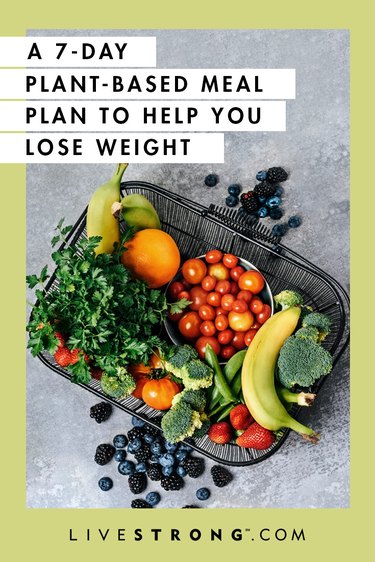
You've heard all the buzz about plant-based diets — they boast promising health benefits and may even help you drop a few pounds.
If you've been meaning to give this veggie-forward eating plan a whirl, there are a few things to consider and plan for to ensure your plant-forward diet is a success.
Video of the Day
Video of the Day
What Exactly Is a Plant-Based Diet?
People have widely differing opinions on what they think a plant-based diet means, the International Food Information Council Foundation's 2019 Food and Health Survey shows.
About one-third of the people surveyed believe it's a vegan diet (avoids all animal products including dairy or eggs), while about 30 percent believe it means focusing on minimally processed foods that come from plants with limited intake of meat, eggs and dairy. Another 20 percent thought that a plant-based diet was the same as a vegetarian diet while eight percent claimed it means trying to get as many fruits and vegetables as possible without limiting meat, eggs and dairy.
So who's right? Simply put, a plant-based diet encourages primarily eating plants and occasionally including animal products. While vegetarian, vegan and plant-based diets have similar tenets, they are not the same. One way they differ is that vegetarian and vegan diets have clear established guidelines and rules to follow while a plant-based diet does not.
However, the customizability of a plant-based diet makes it a popular plan. Interest in eating a plant-based diet — or at the very least substituting animal products with plant-based foods — is growing as we continue to learn more about the benefits of eating this way, coupled with innovation from manufactures. In fact, grocery sales of plant-based foods that replace animal products have grown 29 percent from 2018 to 2020, according to the Good Food Institute.
Why Should You Eat More Plants?
Eating a plant-based diet can do our body some good, according to research.
1. A Plant-Based Diet Is Linked to Heart Health
Those who eat more plant-based foods and fewer animal products were observed to have a lower risk of dying from a heart attack, stroke or another cardiovascular event, according to an August 2019 study in the Journal of the American Heart Association.
But the kinds of plant-based foods you're filling up on matters, too. Plant-based dieters who ate a diet primarily focused on fruit, vegetables, whole grains and nuts were observed to have a significantly lower risk of heart disease while plant-based eaters who frequently drank sugary beverages and ate refined grains and other ultra-processed foods were observed to have a higher risk of heart disease, a July 2017 study in the American College of Cardiology found.
2. It's Associated With Lower Risks of Type 2 Diabetes
Research shows that following a plant-based diet may help lower your risk for developing type 2 diabetes.
A July 2019 meta-analysis published in the Journal of the American Medical Association looked at nine studies including more than 300,000 people and found that eating more plants (fruits, vegetables, whole grains, legumes, nuts and seeds) is associated with a lower risk of developing type 2 diabetes.
3. It May Help You Lose Weight
There's a growing body of research connecting vegan and vegetarian diets to a lower body mass index (BMI) and smaller waistlines. In fact, research presented at the European Association for the Study of Diabetes in 2019 revealed that following a 16-week vegan diet can increase the good bacteria in your gut that are connected to improving your weight and body composition.
But the good news for carnivores is that you might not have to give it all up to lose some weight. According to a March 2019 report, those who followed a plant-based diet the most — as in, ate more plants and less (but in many cases still some) meat — were observed to have smaller waistlines and lower BMIs and body fat percentages, per the Epidemiology study.
How to Get All the Nutrients You Need on a Plant-Based Diet
Like with any meal plan, sticking to a plant-based diet requires some planning and preparation. Plant-based, vegetarian and vegan diets tend to lack certain nutrients that are usually obtained via animal sources.
So, make sure you're eating enough of the nutrients below:
- Choline is a nutrient typically found in beef liver, eggs, beef, seafood, chicken breast, shellfish and milk. Plant-based sources include wheat germ, Brussels sprouts, peanuts, soybeans, mushrooms and potatoes.
- Omega-3 fatty acids are found in cold-water fatty fish like tuna, mackerel, herring, salmon and sardine. Plant-based sources include flaxseed, soybeans, walnuts, chia seeds and basil seeds.
- Vitamin B12 is typically found in animal products including fish, poultry, eggs, meat and milk products. Plant-based sources include nutritional yeast, fortified breakfast cereal and fortified plant milks.
- Vitamin D is naturally found in fatty fish, fortified milk, and eggs. Plant-based sources include fortified orange juice, fortified cereals and some mushrooms. The sun is also a great way to get vitamin D.
- Calcium is typically found in dairy products, sardines and salmon. Plant-based sources include fortified soymilk, fortified OJ, tofu (made with calcium sulfate), kale, Chinese cabbage and broccoli.
- Iron is a mineral found in beef, oysters, sardines, beef liver, and chicken. Plant-based sources include: fortified breakfast cereals, white beans, lentils, spinach, firm tofu, kidney beans, chickpeas and tomatoes
- Zinc is naturally found in oysters, beef, shellfish, pork chops and chicken. Plant-based sources include baked beans, pumpkin seeds, cashews, chickpeas and oatmeal.
Your 7-Day Plant-Based Meal Plan for Weight Loss
This weeklong meal plan packs in nutrient-dense, plant-based foods into each breakfast, lunch and dinner. Each day delivers between 1,400 and 1,600 calories to promote sustainable weight loss.
Get shopping!
Sunday
- Breakfast: This Toasted Coconut Smoothie has 7 grams of fiber. To up the protein content, add your favorite plant-based protein powder.
- Lunch: White beans instead of chili beans make this a White Winter Chili. Top with one-fourth of an avocado.
- Dinner: This pizza might not have meat but it's not lacking flavor. The Baby Arugula, Fig Jam and Caramelized Onion Pizza has a sweet yet savory and peppery flavor you'll love.
Monday
- Breakfast: Pair this on-the-go Charred Portobello "Steak" Breakfast Sandwich with a side of fruit.
- Lunch: You won't believe all of the veggies and beans packed into this All-American Vegan Cheeseburger.
- Dinner: Your plant-based dinner is served with this two-part Asian Veggie Soba Noodle Soup as a starter and Easy Dijon Salmon as your main. Add a vegetable for a side to your entrée.
Tuesday
- Breakfast: This Meatless Mexican Wrap will keep you full until lunch.
- Lunch: Yes, you can still have mac and cheese with this Plant-Powered Butternut version. Pair with our favorite side salad as a starter.
- Dinner: These Beans and Greens Tacos will not disappoint. Filled with spices and herbs, they're full of flavor.
Wednesday
- Breakfast: Try our savory twist on oatmeal by pairing with veggies instead with this Savory Vegan Zucchini Oatmeal recipe. Add a cup of berries on the side for extra nutrients including fiber.
- Lunch: Swap out the meat for extra beans and lentil in this Slow Cooker Chili recipe. Top with avocado for healthy fats and complete your lunch with an apple.
- Dinner: This Buddah Veggie Rice Bowl is packed with veggies, fresh herbs and whole grains.
Thursday
- Breakfast: This Southwestern Egg Scramble has it all, pairing protein (from the eggs), carbs (from the black beans) and fat (from the avocado) for a complete breakfast that'll keep you satisfied.
- Lunch: You can eat the "dishware" in this Bejeweled Butternut Squash. The stuffed shell acts as your bowl and is filled with healthy fruits, veggies and whole grains.
- Dinner: These Sweet Potato Sliders include tofu which helps to bump up the protein content. Enjoy these Apple Fries for dessert.
Friday
- Breakfast: Salad for breakfast? We promised you won't be disappointed with this Winter Panzanella Breakfast Salad. Enjoy with an orange on the side.
- Lunch: This delicious Vegetarian Bibimbap is an easy way to sneak in a bunch of vegetables. Enjoy banana and peanut butter on the side to complete the meal.
- Dinner: This Instant Pot Risotto with Dried Mushrooms, Asparagus, Peas and Spring Onions packs 30 grams of protein and eight grams of fiber.
Saturday
- Breakfast: Chia seeds in place of eggs make these Lemon Chia Vegan Pancakes possible.
- Lunch: Chickpeas make a delicious swap for any meat in this Smashed Chickpea Club Sandwich. Pair with an apple on the side.
- Dinner: Tempeh boosts the protein content in this Asparagus, Shiitake and Tempeh Stir-Fry dish that packs in 24 grams of the muscle-building macro.

- Good Food Institute: "Plant-Based Market Overview"
- International Food Information Council Foundation: "Interest in Sustainability, Plant-Based Diets Among Trends in IFIC Foundation’s 2019 Food & Health Survey"
- Journal of the American Heart Association: "Plant‐Based Diets Are Associated With a Lower Risk of Incident Cardiovascular Disease, Cardiovascular Disease Mortality, and All‐Cause Mortality in a General Population of Middle‐Aged Adults"
- American College of Cardiology: "Healthful and Unhealthful Plant-Based Diets and the Risk of Coronary Heart Disease in U.S. Adults"
- Epidemiology: "Plant-Based Diet and Adiposity Over Time in a Middle-aged and Elderly Population: The Rotterdam Study"
- Journal of the American Medical Association: "Association Between Plant-Based Dietary Patterns and Risk of Type 2 Diabetes A Systematic Review and Meta-Analysis"
- European Association for the Study of Diabetes: "55th Annual Meeting of the European Association for the Study of Diabetes"